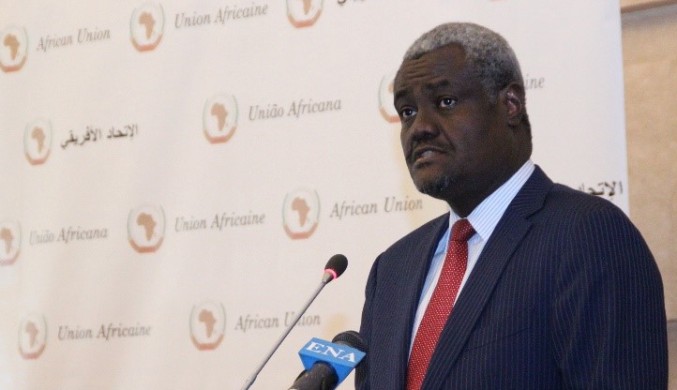AU urges Ethiopian rivals to ceasefire, recommit to peace talks
By Tesfa-alem Tekle
October 17, 2022 (NAIROBI) – The African Union (AU) has called for an unconditional cessation of hostilities in northern Ethiopia and urged the warring parties to “recommit” to direct peace talks.
“Chairperson of the African Union Commission, Moussa Faki Mahamat, is following with great concern reports of increased fighting” in the war-torn Tigray region,” said an AU statement issued on Saturday.
The AU chief called for an “immediate, unconditional ceasefire” and for the resumption of humanitarian services to the Tigray, where 90 per cent of the estimated seven million people in the region depend on international humanitarian food aid.
“The Chairperson urges the Parties to recommit to dialogue as per their agreement to direct talks to be convened in South Africa by a high-level team led by the AU High Representative for the Horn of Africa and supported by the international community” reads part of the released brief statement.
The Ethiopian government has not yet reacted to the AU statement, but the government of Tigray said it welcomes the AU statement but called on the international community to take concrete actions against Eritrea to withdraw its forces from the territories of Tigray.
“We are ready to abide by an immediate cessation of hostilities,” said a statement released by Tigray External Affairs Office on Sunday evening.
“We also call on the international community to compel the Eritrean army to withdraw from Tigray, take practical steps towards an immediate cessation of hostilities, and press the Ethiopian Government to come to the negotiating table”.
The Tigray statement accused Ethiopia and Eritrean forces of continued joint attacks which are being carried out “deliberately brutalizing civilians, are not just a violation of international law but an affront to humanity”.
“indiscriminate aerial and artillery bombardments targeting civilians are destroying entire towns, villages, and homes”.
“The massacres, rapes, displacement and starvation remain below the world’s radar screen, but are part of a systematic genocidal campaign”.
“The international community has a choice to make: either ensure an immediate cessation of hostilities or help the people of Tigray defend themselves against genocidal onslaught”.
“If neither path is followed, the people of Tigray will continue to fight to ensure their survival, for they will never allow themselves to be ruled against their will. Without peace in Tigray, there can never be peace in Ethiopia” the statement added.
Earlier, Getachew Reda, a spokesperson for the Tigray forces and advisor to the President of the Tigray Region, welcomed the AU calls for a ceasefire and resumption of humanitarian aid.
“We believe it is a very welcome, if long overdue, statement in light of the extremely alarming humanitarian crisis unfolding as a result of the campaign by the Eritrean army and its Ethiopian allies,” he said in a tweet.
The latest call for a truce comes as the continent bloc struggles to bring the warring parties to the negotiating table.
AU-led peace talks scheduled for October 9, in South Africa, were postponed over what diplomatic sources said was due to logistical reasons.
After it was postponed, the AU has not yet fixed a date for any future meeting between the warring parties.
Speaking to Sudan Tribune, Metta-Alem Sinishaw, an Ethiopian political analyst, says the latest AU statement tells at least the international community is not ignoring the ongoing crisis.
“Mr Hammer is in Addis and AU is pressurized to appease the International community,” He said.
“The statement doesn’t seem poignant and may not help to stop the ongoing conflict! Both parties may even respond favourably and continue business as usual” he added.
The conflict between Tigray Defence Forces and the federal government broke out in November 2020, and since the region doesn’t have access to basic services including electricity, telephone, internet and banking services due to a total blockade imposed by the central government.
The civil war has claimed the lives of tens and thousands of people and displaced many more.

